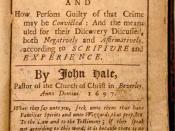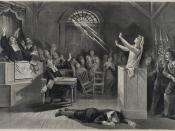The Crucible: A Critical Interpretation
The Crucible is a distinctly and overtly subversive text. It problematises the conventional idea that 'good' books and plays provide access to certain universal or absolute truths. In fact, it calls such truths into question. Audiences see absolute ideas set up at the beginning of the play, and then dismantled as the play progresses. 'Christianity' is revealed as hypocrisy, 'truth' is revealed as lies, the unity of Salem society is revealed as factional rivalry.
In the prose section in the bottom third of p.37 readers/viewers are told that binary oppositions like good/evil are misguided, and are really 'relative, ever-changing, and always joined to the same phenomenon'. This is a clear example of the idea associated with the influential French critic Jacques Derrida that all ideas carry with them traces of their opposite. This leads us to the view that binary oppositions are not real, that they are actually loaded with political meanings.
The events of the play expose the uses people make of constructs like good/evil or God/Devil. The less sympathetic characters in the play are the ones who make the most noise about right and wrong, good and evil, God and the Devil. It is already clear in Act 1 that the high morals and ideals of Reverend Parris and Thomas Putnam are actually political tools that they use to hurt others and to achieve their own very materialistic and impure goals. By showing the reader that these righteous characters are actually hypocrites, the play forces us to question concepts like Christian behaviour, unity, and justice.
A good example of how the play 'deconstructs' traditional concepts lies in the representation of the Devil. On page 38, we are guided to seeing the opposition between God and the Devil as a political trick, like...


